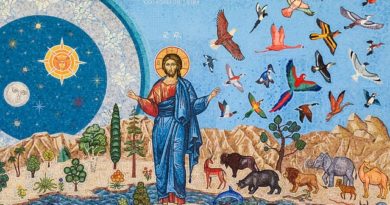Battlefield: Are We Fighting the Ancient ‘Gods’?
By Derek Gilbert
You’re standing on a battlefield. A war rages around you, although you can’t perceive it—not directly.
The combatants are supernatural. On one side, the Creator of the universe: God. Yahweh, or YHWH, if you prefer. On the other, evil intelligences who chose rebellion over service long ago.
In former days, people were closer to the conflict than we are today. Or maybe they were just more sensitive to the struggle. Three thousand years ago, if the Bible is to be believed (and it is), people understood that nations were under the rule of gods.
While people might believe in a pantheon, nations in the ancient Near East were championed by national deities—Chemosh for Moab, Molech for Ammon, Marduk for Babylon, Ashur for Assyria, Hadad for Aram, and so on.
Today, Christians have a cosmology that’s been, well, dumbed down since the apostolic age. For the last 1,600 years, we’ve been taught that since God is the only true god, then the gods of the nations around ancient Israel were just imaginary beings represented by carved images.
That is spectacularly incorrect.
Many Small-G gods in the Bible

The authors of the books of the Bible understood that there were many small-G gods. They knew that these supernatural entities had been assigned to the nations, but that Israel had been reserved for Yahweh. Their writings reflected this. It’s in the Bible. We just haven’t heard about it in church. For example, when God told Moses:
For I will pass through the land of Egypt that night, and I will strike all the firstborn in the land of Egypt, both man and beast; and on all the gods of Egypt I will execute judgments: I am the Lord. (Exodus 12:12, ESV, emphasis added)
Or later, when we read:
They set out from Rameses in the first month, on the fifteenth day of the first month. On the day after the Passover, the people of Israel went out triumphantly in the sight of all the Egyptians, while the Egyptians were burying all their firstborn, whom the Lord had struck down among them. On their gods also the Lord executed judgments. (Numbers 33:4, ESV, emphasis added)
Now, are we supposed to believe that God inspired Moses to write about His righteous judgments on lifeless bits of wood and stone?
The conflict between Yahweh and the gods who chose to rebel is most clearly seen in Psalm 82:
God has taken his place in the divine council;
in the midst of the gods he holds judgment:
“How long will you judge unjustly
and show partiality to the wicked? Selah
Give justice to the weak and the fatherless;
maintain the right of the afflicted and the destitute.
Rescue the weak and the needy;
deliver them from the hand of the wicked.”
They have neither knowledge nor understanding,
they walk about in darkness;
all the foundations of the earth are shaken.
I said, “You are gods,
sons of the Most High, all of you;
nevertheless, like men you shall die,
and fall like any prince.”
Arise, O God, judge the earth;
for you shall inherit all the nations! (Psalm 82:1-8, ESV, emphasis added)
The Divine Council

Traditional analysis explains away the use of the word “gods” in this psalm as references to human rulers. This makes less sense than a straightforward reading of the text.
Yahweh presides over a divine council that is tasked with carrying out His orders. Some of these supernatural beings disobeyed orders and were informed by God that their punishment would be to die “like men.” That makes no sense if God was addressing a human audience.
The divine council concept is not new, although it may be to you. (It was to me when I first encountered it ten years ago.) Rather than build a case for it here, which would cover territory that’s already been explored in greater depth by better minds, I recommend Dr. Michael S. Heiser’s excellent book The Unseen Realm.

In a nutshell, a group of seventy bene elohim (“sons of God”) were assigned to supervise the nations after God divided mankind at Babel. You’ll note that seventy ethnic groups are named in Genesis chapter 10, the Table of Nations. This is not a coincidence
These supernatural sons of God apparently decided to present themselves as gods to humankind, which prompted God’s counter-move: He reserved one nation for Himself that would someday produce the Savior.
The Sacred Mountain

Mountains have always been key in this drama. People have known since our earliest days that mountains are sacred, the abode of the gods. Why? Is it the mystery inherent in locations that are remote and inaccessible? Is it the awe inspired by their size and beauty? Is it simply that primitive humans noticed that mountains were tall and closer to heaven than where they lived?
No. Mountains are sacred because the original location of the divine council was on a mountain. The original home of humankind was also on that mountain. After rebellion broke out, the Fallen chose other mountains to call their own. And all of history is a chronicle of the long war that broke out on the original cosmic mountain, Eden. (Yes, it’s a garden, but it was also on a mountain. See Ezekiel 28.)
But the accounts of this war aren’t just contained in the Bible. Secular history records important information about this conflict, although most scholars don’t see it for what it is.
The war between God and the gods has been fought in the supernatural realm and in our time-space domain by human agents of the warring parties. In the months ahead, we’ll look at some well-known events in the Bible in a way you maybe haven’t before—acts of war by God against the gods that you’ve been told are imaginary.
The Titans of Greek Mythology

We’ll examine one of the people groups Joshua and the Israelites had to fight to claim their new homeland in Canaan. We will document the connections between this group of people and the shadowy race of giants called the Rephaim, the occult center that was Babylon (past and future), the king of Egypt who was forced to let God’s people go, and the mythical race of old gods called the Titans.
You read that right: There are links between the Titans of Greek mythology, ancient Egypt, Babylon, and Canaan, and the prophesied Babylon the Great.
We’ll also examine the roles of two divine entities that have been particularly resilient in the long war, appearing again and again at key points in history. And we’ll present what we think is a plausible scenario for the end times that’s best described as a cosmic double-cross, a PSYOP that exploits our human biases and weaknesses—nationalism, racism, and a desire to take onto ourselves a role that God has reserved for the Messiah.
This all sounds like what skeptics call “woo,” but it’s not. These claims are based on documented history, theology, and linguistics. No fringe research, and only a little speculation—although the scholars whose work I cite would probably disagree with my conclusions. That’s to be expected. We’ll apply a supernatural filter to offer an analysis of why history happened the way it did, and to demonstrate that the historical record supports the biblical account if you look at it the right way.

But mainly we want to emphasize that the supernatural war that’s been fought since Eden is more obvious than you think. If you read the Bible with your spiritual eyes open, you’ll see stories you’ve known since Sunday School a whole new way.
The command centers of this long war are mountains. The prophesied climactic battle at the end of history will be fought for control of one specific mountain. We will identify the key mountains of history and lay out a prophetic scenario that the Enemy may use to deceive the world into accepting their man as a savior.
Is Satan Real?

Sadly, most American Christians don’t believe Satan is real, much less end times prophecy.
To confuse things even further, the Fallen have introduced other religions into the end times mix, most significantly Islam. Muslims will play a significant role in the unfolding drama.
Sadly, for them, their end won’t be victorious global jihad. Their most likely future is as sacrificial victims to draw Jews and Christians into the greatest double-cross in history.
Jesus didn’t warn us of a great deception for nothing.

Derek Gilbert hosts SkyWatchTV, a weekly Christian television program, and co-hosts SciFriday, a weekly television program that looks at science news with his wife, author and analyst Sharon K. Gilbert. His broadcast career spans nearly four decades, with stops in Little Rock, Saint Louis, and Philadelphia, and he’s been interviewing guests for his podcast, A View from the Bunker, since 2009. Derek is author of the groundbreaking books The Great Inception and Last Clash of the Titans. He’s also the co-author with Josh Peck of The Day the Earth Stands Still, which exposes the occult origins of the modern UFO phenomenon. His forthcoming book, Bad Moon Rising: Islam, Armageddon, and the Most Diabolical Double-Cross in History will be published in the summer of 2019. Derek and Sharon are currently writing Profiling the Dead, about ancient death cults and the Bible, which should be out in late 2019. Derek is a popular conference speaker, a lifelong fan of the Chicago Cubs, prefers glasses to contacts, and has been known to sing the high part in barbershop and gospel quartets. Find out more at www.derekgilbert.com, www.gilberthouse.org, www.vftb.net, orwww.SkyWatchTV.com. Follow him at Facebook.com/DerekGilbert or on Twitter @DerekGilbert.



